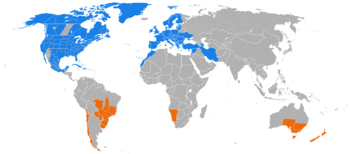CJ posted an interesting perspective on Daylight Saving Time - DST (which in Britain we call British Summer Time - BST) here. That and the comments that had been published when I read the post together with the spooky fact that my central heating time clock re-set itself automatically (it was presumably taking its cue from the German radio-controlled clock that I have in the kitchen, made me think. And, as my friends know, that is some achievement.
Why do we still persist with DST? Who is 'we'? I found the answer to the latter question (shown in the map) quite interesting. I hadn't realised (until I read Meike's (Librarian) comment on CJ's post that Russia with it's 9 time zones didn't observe DST. China doesn't either but I've never quite understood how China works things out given that it only has one official time even though it covers a massive five geographic time zones.
Why was DST introduced in Europe? According to Wiki Summer Time was first introduced in some countries during the First World War, then largely abandoned with some exceptions, mostly during the Second World War, until the 1960s and 70s when the energy crisis prompted a wide scale re-introduction. The practice has been fully coordinated across the continent since 1996.
In the UK the arguments seem to revolve around children going to school and road safety. That's purely a perception on my part by the way I've done no research on the subject. In many ways though the energy crisis would still be a relevant factor if it was relevant back in the 70s.
Here on Lewis BST makes relatively little difference because at midsummer we have sunrise around 0300 GMT and sunset around 2130 GMT but it's light(ish) all night anyway.
Anyway then I started thinking about New Zealand where I have heard a lot of discussion over recent years and where there are some wonderfully odd things as a result.
New Zealand time, including DST, is used by several Antarctic bases that are supplied from New Zealand. This results in the oddity that the Amundsen-Scott South Pole Station sets its clocks an hour further ahead during the southern summer, when the sun is constantly above the horizon, than in the southern winter, when the sun is constantly below the horizon. The extreme geographic position of the base means that no possible adjustment of the daily activity cycle can have any effect on the amount of sunlight received during those activities. However, the arrangement presumably makes real time communications with New Zealand more practical, particularly in dealing with offices.
The New Zealand dependencies of Cook Islands, Tokelau and Niue do not maintain DST. They are located on the other side of the International Date Line and differ between 22 and 24 hours from New Zealand proper.





I have never been able to see any rhyme nor reason to it.
ReplyDeleteIt has much in common with most of the rubbish that emanates from governments. I wonder hour much money has been expended discussing it.
I was impressed by Dithery though. I half expected GMT to be cancelled at the eleventh hour.
It is a bit puzzling I agree. Certainly the debate in New Zealand seems to be very vocal. It's like so many things, Adrian: give people something to debate and they will debate it ad nauseum.
DeleteMany years ago(thank goodness) DST was introduced to the island, and we suffered through the ridiculous time change for many years. Then one year it was abandoned, and we breathed a sigh of relief.
ReplyDeleteNow some "ididot box" in Parliament wants to reintroduce it again....there are many more serious issues at hand affecting this island I can assure you.
So much wasted time and money on non-issues over the years (like changing our status to a Republic, making our head of state a President to get away from the British governmental system).
I hope that DST does not ever rear its ugly head here again...just not needed.
I have come to the same conclusion Virginia but it won't stop the debate.
DeleteI was never a fan of it either, for much the same reasons as you give (being about as far north here). I complain every spring and find the re-adjustment in the autumn easier.
ReplyDeleteIt just seems so unnecessary Monica.
DeleteMy grandparents told me that daylight savings time was introduced to give farmer workers a longer day ... but since you can always get up earlier in summer if you want to, I don't see much point. I liked CJ's blanket post though. That's what Grandma Nelson used to say!
ReplyDeleteYour logic is impeccable Carol.
DeleteOh, a German kitchen clock manipulating your digital gadgets. I’d be careful if I were you!
ReplyDeleteDST time is usually a bit of a pain for me. It doesn’t make much sense, but aren’t we here in the decadent southwest told it’s to make life easier for children in the frozen north? (Scotland, that is) Anyway, I didn’t sleep well last night so I was very grateful for the extra lie-in this morning.
Whatever one may be told about things being for children (or anyone else for that matter) in the 'frozen North' I think it can be discounted. In my experience Westminster rarely considers the North of Scotland's welfare - there's no votes in it for them.
DeleteI have never understood it. Farmers get up when it's light and work until the crop starts to get wet, when the cost of drying outweighs the cost of harvesting. Some, the money men, start at ludicrous hours, whether it's light or dark outside. If it's about school children, why not simply change the hours of the school day? Except, of course, their parents would have to change their working day. So, who exactly does the change of clock suit? Beats me.
ReplyDeleteThe supposed rationale seems to defeat everyone Marcel.
Delete